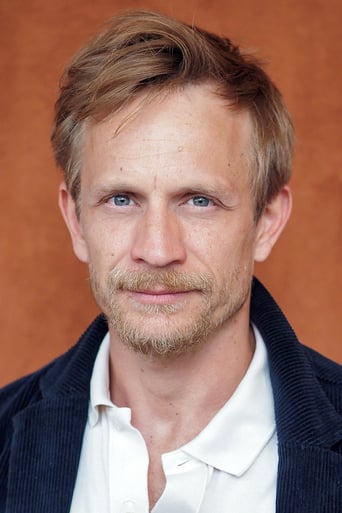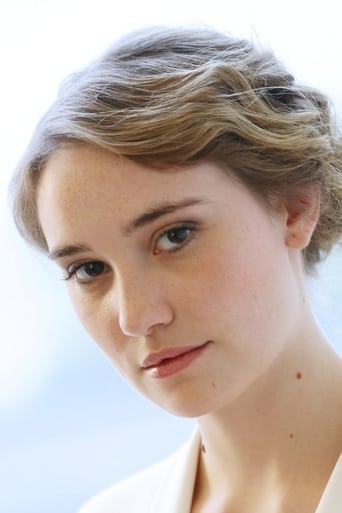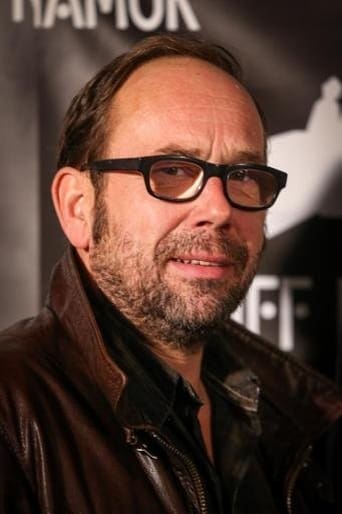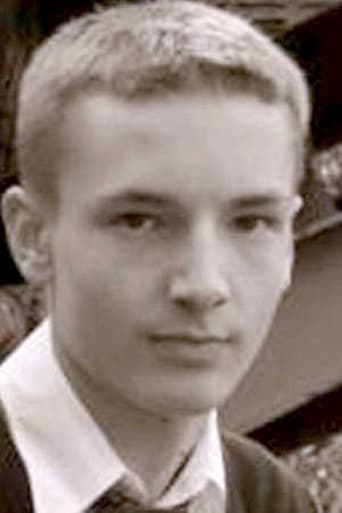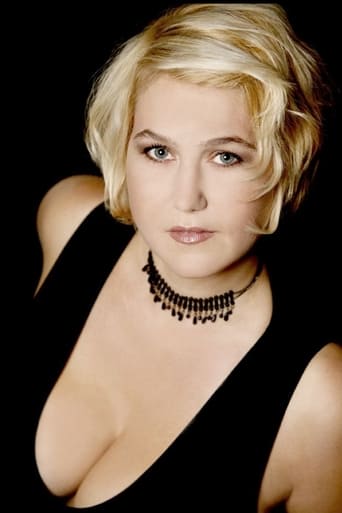Claysaba
Excellent, Without a doubt!!
Derry Herrera
Not sure how, but this is easily one of the best movies all summer. Multiple levels of funny, never takes itself seriously, super colorful, and creative.
Lucia Ayala
It's simply great fun, a winsome film and an occasionally over-the-top luxury fantasy that never flags.
Marva
It is an exhilarating, distressing, funny and profound film, with one of the more memorable film scores in years,
ElMaruecan82
All Dardenne brothers' movies have a central character but all these characters don't necessarily have a character's arc. As my immersion into the sibling's unique but strangely flawless body of work progresses, I find these two storytelling devices equally fascinating, in the way they convey the real 'flavor' of life, living a day without knowing what the next one will be... a grimmer look on Forrest Gump's iconic 'box of chocolates' metaphot.
In movies like "The Promise" (their 1996 breakthrough), a young teenager is confronted to a moral dilemma after the tragic death of an illegal immigrant and chooses to help his widow and son instead of pursuing the same criminal path than his father, in "Two Days, One Night"; that earned Marion Cotillard an Oscar-nomination, the actress played a depressed factory worker confronting each workmate during a weekend to ask them to renounce an 1000 euros bonus to avoid her dismissal. These two movies consisted of long harrowing journeys where their protagonists managed to transcend their initial conditions, proving that even in a crisis-stricken society, there's still a glimmer of hope and reasons to have faith in humanity.
Other Dardennes' movies didn't share the same optimism, and both happen to be their Golden Palm winners. "Rosetta" featured a young girl determined to work and not to end like her depraved alcoholic mother that she would do anything to get a job, even the most unethical actions. But when she could work, she seemed to have lost the ability to be happy, as if she had already entrapped herself in an existential dead-end. In "The Child", we find Jeremy Renier, the kid in "The Promise", in his early twenties, as Bruno, the father of the titular child, along with Sonia (Deborah François) a girl in her late teens. Despite the title, the film is pretty much centered on the 'father', but the word father is to be kept between crosses. I was misled by the synopsis and the premise that 'Bruno would learn to become a father'... there is no journey in "The Child" despite some bits of remorse expressed by Bruno.
Still, the only identifiable pattern in his behavior is that he never thinks of the consequences and is so eager to make quick cash through begging or petty crimes that he never questions his ethics. Some people don't have scruples, some have, some don't even think about it. Are they dangerous? Potentially, yes. But they're a danger for themselves first because once you stop thinking of the consequences, your life can't have any purpose anymore. The irony is that Sonia, who's as immature and childish as Bruno, does have one and it happens to be her son. Although it's implied it was an accidental pregnancy, the couple is genuinely in love and love is actually an understatement, in two consecutive scenes, the Dardennes exposed the love on-going between the couple in a way that both captures their innocence and foreshadows the upcoming incident.
Indeed, this is intelligent filmmaking at best because it features the two sides of the coin, how innocence can be cute and corny only to raise an uglier and far more tragic head later. First, you see them playfully but recklessly teasing each other in the car and it's a miracle it doesn't end with an accident. Later, they play with food and end up embracing each other as if they were at the verge of making love once again without any care for their child... it's like we viewers are asked by the Dardennes to care for the kid because the parents obviously can't. But it's Bruno who crosses the line by doing the one thing not even the most experienced moviegoer could see coming: selling the child.
With an eerie attention to details and in their trademark documentary style, the Dardennes shoot the scene like a drug deal where a baby replaced the loot. But once again with the Dardennes, a scene never plays on its own, it's often a set-up to a more powerful moment. The pay-off comes when Bruno triumphantly shows a big bundle of euros to Sonia, announcing in the most matter-of-factly way that they sold their child. Sonia's reaction takes her back to a norm so severely lacking in the previous scenes, she faints and need immediate hospitalization. It's a dramatic moment but at least we know she is normal, and the fact that Bruno doesn't realize the gravity of his action that establishes his true character, one who has an uncommon lack of comprehension of the world, so wrapped up in immediacy that his soul lost itself in the process.
I compared the film with "Rosetta" but even she had a defining goal, she needed a job and that encompassed all her actions. Bruno spends the whole film needing money, and even when he manages to get the child back, he seems to be sliding in the same path, endangering the life of another child. For all his flaws, we're never put in a position to despise Bruno, we pity him but in the same way, we fail to admire him when he seems regretful or when he makes amends... the Dardennes never allow certitudes, as if we were allowed to trust our perceptions. At the end, when Bruno finally weeps, we might take it as redemption, but it can be despair. Who knows?
And "who knows?" is the question, "The Child" feels like a character study but there's an intellectual undertone behind that term, indicating a form of arc, an evolution, a coming-of-age. The Dardennes brothers could make such a film but I applaud the way they kept a shadow of doubt about the future of Bruno, by focusing so much on his actions that we're so close yet so far from his conscience, like Bruno who by getting so close to money let it get the worse from him...
John Flynn
"L'enfant" is a clever, well-made, nontrivial dramatic masterpiece that solely relies on ordinariness and aesthetic of the real life, which makes this captivating film look wonderful and horrifying at the same time. The dialogues are minimal, but the actions of the characters speak for themselves. The characters don't feel like characters at all. They feel like humans, which is the best compliment that you can give to a character. The real life feel is what makes this film work so great. Everything feels natural and believable, which is the strongest part of all Dardanne duo films. The ending is tragic and hopeful at the same time. The film couldn't ended on a better note. 10 out of 10.
sumantra roy
In the beginning of the film, one feels that Sonia, an eighteen year old gentle mother is the main character of L'infant, and the film would revolve around her struggle of bringing up her kid as well as getting along with her criminal husband. But soon enough, Bruno, the father, takes the main stage. He runs a gang with two teenage boys. He steals and sells everything. He is also devoid of any human emotion. When Sonia returns from the hospital with the newborn child, she finds that Bruno has rented her apartment to another couple. Desperate Sonia seeks out Bruno and finds him in a traffic signal. It seems that when Sonia was in hospital giving birth to their child, Bruno never visited her. Bruno is no way emotionally attached with the child. Interestingly Sonia doesn't apparently have any problems with these. Sonia is also very much aware of what Bruno does for a living. She gets on with him all right, and the film depicts some wonderful love and fun sequences between the two.Few days later while waiting in a long queue, Sonia tells Bruno to take Jimmy (their kid) out for a stroll, Bruno accepts the offer and on his way decides to sell off the child. A decision that comes as a shock. He makes one or two phone calls and tells them that they have taken this decision jointly. He gets five thousand Euros in exchange, and returns with the empty perambulator. Bruno tells Sonia and shows her the money he has got in exchange. He also naively tells Sonia that they can have another kid, what's the big deal. Sonia faints and falls on the ground. Bruno didn't expect this. He never though about how Sonia would react, didn't think about the consequences. He takes Sonia in his laps and goes out to search for a cab that will take them to the hospital. Now, here happens an interesting thing, in the beginning I said that Bruno is devoid of any human emotion, yes that was true till this point, now it seems a bit different. If that was really the case then Bruno could have simply left Sonia there and escaped. I mean, that would not be surprising from him. He is someone who can simply sell off their nine day old kid without even bothering about kid's mother. When you really see him doing that, you kind of refuse to believe whatever that is going on. You find it stretched too far. What I mean is, one can then always stretch it a bit further. But the fact that Bruno can't leave Sonia there, proves that he has some attachment with her. Seeing Sonia like this he also decides to take the child back. Well, he had some human possibility still left with him. From here on the film is quite predictable. We now know the limits of Bruno's inhuman side, but his human possibilities are still unexplored. Bruno will understand his mistakes and will apologies (seems like his first apology in life), though it takes some time for him to do so, and in between another incident happens. But let's not go into that, Bruno will cry his heart out and Sonia will forgive him. And the film will end with this positive note, well done, great, whatever, anyways… I have two points to make, one, who is Sonia? I don't know where she comes from; don't know how she manages to fall in love with someone like Bruno. And even after everything she goes to meet Bruno in the jail and again, manages to forgive him. It seems very strange to me. Is it Christian charity? Is it the so called love and forgiving nature of womanhood? And second, the film ends on a positive note with Bruno realizing, that's fine. But isn't the final redemption a bit inconsistent, a bit forced? I have seen films where illegitimate actions are portrayed as cool and having no consequences, I have my share of problems with that thing too, but really we have been seeing criminals like Bruno's final redemption for ages in films, and probably it will continue for ages too, it's a bit weird for me, that's all.The film, L'infant uses a lot of hand held camera, which gives a marvelous result, it has natural sounds and no background music, making wise, it's definitely non-Hollywood and that is great. Both Bruno and Sonia were amazing in their performance. The film also uses long takes at certain moments remarkably well. Two instances come to mind right now, one when Bruno leaves the kid on the floor and waits outside for the money, the camera stays with him, and secondly when Bruno and Steve hide themselves from the cop. We don't get to see what is happening on the other side, and it really builds up the suspense. A similar treatment was also affectively used in No Country for Old Men among others, and it can be very moving if properly used.
butchfilms
This Belgium's film makes you think how there are people in this world who make things without realizing the consequences that will cause their actions that will hurt their loving ones. Infant, L' is about a young couple who just had a baby boy but they are so immature to raise him. The father is Bruno, he is a thief and he doesn't care much about the baby unlike Sonia who is the mother. Bruno lives only for the moment so he is always looking to get money to survive the day that's why he steals with some teens. But one day Bruno sells his baby and when he tells Sonia about it like the most normal thing showing her the money expecting that she will get happy, real problems will begin for Bruno....This movie doesn't have much dialog is more about physical expressions of/between the two leading characters and its pace is a little slow . So if you don't like this kind of movies maybe this is not for you, but I have to say I don't like most of this kind of films but I liked this one, so I advice you to take a chance and watch it because at the end if you didn't like it, at least it will have left you something to think a about.

